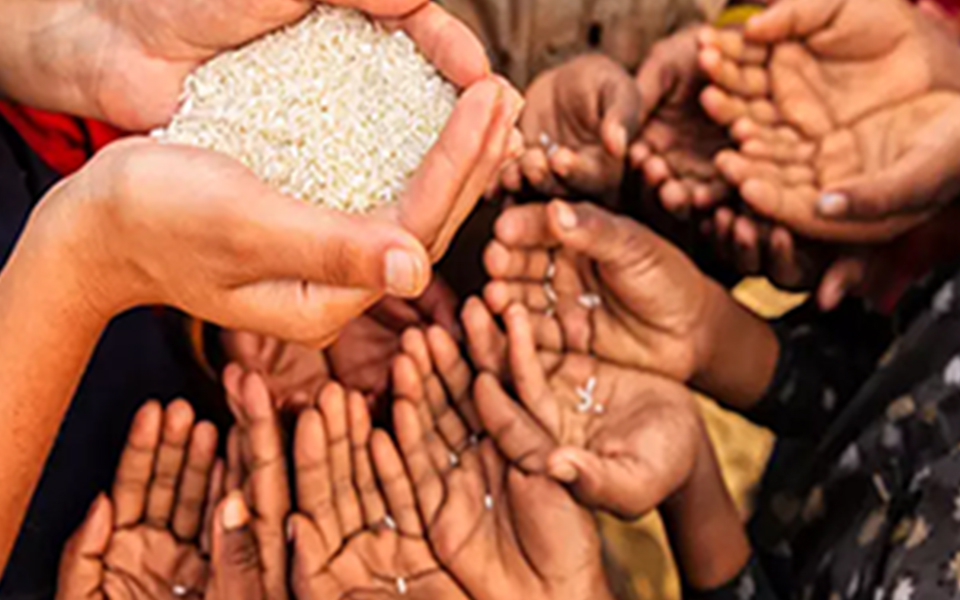The country is dreaming of becoming world super power under the able leadership of Prime Minister Modi. In keeping with this dream, the country often credits itself with economic and technological progress and releases data to support that claim too. The country dreams of roaming the surface of the moon and living on Mars. Yet, amidst all this, the reality that often hurts the dreams is that of millions of countrymen going without food. We may have got political freedom, but freedom from hunger is still a farfetched dream. Government data says more than 50% of the people suffer from malnutrition today.
According to the economic survey of 2017-18, malnutrition of mothers and children is the biggest challenge India is facing currently. Shortage in supply of nutritious food, malnourishment and unhealthy food habits, insufficient consumption of water for drinking, lack of hygiene and inadequate health services are contributing factors to this menace which leads to three out of ten children suffering through their lives. Malnutrition causes irreversible damage to children. It ruins their childhood. It affects their physical and mental health. Most children suffer from malnutrition even before they are born because of the lack of proper nutrition and attention given to pregnant mothers. Nearly 20% of children are born with less than average bodyweight. About 90% of the brain development happens in the first two years of their birth. Malnourishment leads to complicated health conditions of children, including insufficient brain development and turns them into victims of early setting in of diabetes and cardiac problems. With increase in physically unfit generation, the productivity of the country gets affected too.
Over 33.6% women in the country suffer from long term malnourishment. About 55% of them are anemic. Hence, more than half of the women are having babies under most dangerous conditions. Due to anemia, India’s overall loss to GDP stands at Rs 1.5 lakh crore. This figure is more than three times of the budgetary allocation to health in 2017-18. A family of a newborn is eligible to get nutritious food for the baby worth up to Rs 10,332 up to 45 months since the birth of the child.
But the scheme is suffering a massive blow due to corruption and adultrated food supply for this purpose. The recent amendment to National Maternity Benefit Scheme ensures postpartum women are given six months paid maternity leave. Crores of women working in unorganized and private sectors are kept away from this facility. More than 95% of women working in private and unorganized sectors are from very poor background and they have to return to work within a short span of time. Hence they can neither nourish their bodies that have gone through most challenging time, nor can they feed their children for six months since they fear loss of their jobs if they do not return to work as soon as possible.
One stark reality we need to understand is about the link between malnutrition and our socio-economic problems. We are trying to tackle challenges such as TB etc in isolation, as health challenges and we try to find remedies. But we fail to see the link between TB and malnutrition, as a socio-economic challenge. Hunger is the mother of all diseases in our nation. According to World Health Organisation, Diarrohea leads to worms. Consumption of polluted drinking water, living in unhygienic surroundings and unhealthy lifestyle lead to health problems. These health challenges affect the growth of children at a very young age and then the body loses its ability to extract and use nutrition from foods in later stages of life.
Indian body composition is smaller than that of the poorest countries that consume least calories of foods in the world. Children fall easy prey to diseases when they go without nutrition. And when ill, does any child have the capacity to study?
We hope to see the best of scientists and sportspersons being born in India. We hope to see our young men and women succeed. But, when children are born malnourished, and continue to experience challenges of malnourishment, how do we expect them to succeed?
Government says population is the reason for poverty. What we are unable to see is the inefficient distribution of resources that lead to such conditions worsen. With note ban and control on sale of cattle is leading to increased hunger indices.
Our politicians have hundreds and thousands of crores to buy another politician when they want to come together and enjoy the perks of power. At the same time, a common person standing in the queue returns home empty handed. The recent economic crises has pushed the poor further into poverty and the rich into affluence. If this continues, the country may have to declare hunger as a national exigency soon!
Let the Truth be known. If you read VB and like VB, please be a VB Supporter and Help us deliver the Truth to one and all.
Kalaburagi: Four men have been arrested in Kalaburagi on charge of hacking a man with lethal weapons and pelting stones at him under the limits of Station Bazaar Police Station recently.
According to police sources, Anand Jalak Shinde (34), Ashitosh Jalak Shinde (30), Imran Mehboob Sheikh (28) and Sohaib Anwar Qureshi have been arrested. The men are accused of the brutal murder of Syed Mehboob, a resident of Station Bazaar Upper Line Hamalawadi in the city.
An FIR was filed by the Station Bazaar Police Station based on a complaint given by Syed Ismail, father of the deceased Syed Mehboob.
Following quick probe, the police team successfully arrested the suspects within 24 hours. The arrested men were produced in court and have been sent to judicial custody.
The City Police Commissionerate has appreciated in an official release the police team’s quick solving of the murder case and arrest of the four men accused of murdering Syed Mehboob.





